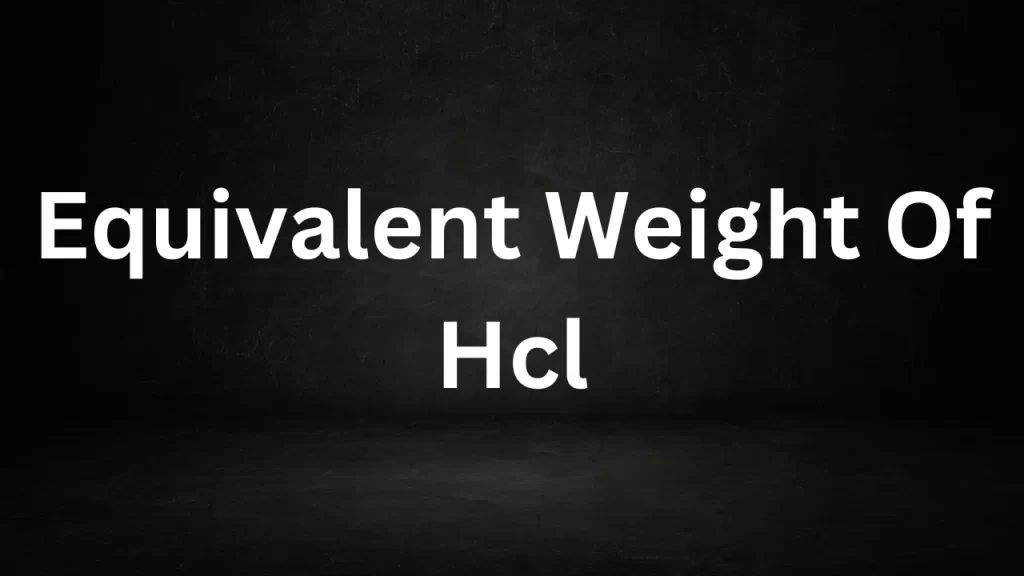Equivalent Weight of HCL
Equivalent Weight Of Hcl: The equivalent weight of hydrochloric acid (HCl) can vary depending on its role in a chemical reaction. To determine the equivalent weight of HCl for a specific reaction, you need to consider whether it acts as a monoprotic or diprotic acid and the specific stoichiometry of the reaction.
 Equivalent Weight Of Hcl
Equivalent Weight Of Hcl
Here are two scenarios:
1. HCl as a Monoprotic Acid:
In this case, HCl donates one hydrogen ion (H⁺) in a chemical reaction. Its equivalent weight is calculated by dividing its molar mass by the number of moles of H⁺ ions it donates, which is 1.
Molecular Mass of HCl = Approximately 36.461 g/mol (as previously calculated) Equivalent Weight of Monoprotic HCl = Molecular Mass of HCl / 1 = 36.461 g/mol
So, the equivalent weight of monoprotic HCl is approximately 36.461 g/mol.
2. HCl as a Diprotic Acid:
In certain reactions, HCl can act as a diprotic acid, meaning it donates two hydrogen ions (H⁺). In this case, its equivalent weight is calculated by dividing its molar mass by the number of moles of H⁺ ions it donates, which is 2.
Molecular Mass of HCl = Approximately 36.461 g/mol (as previously calculated) Equivalent Weight of Diprotic HCl = Molecular Mass of HCl / 2 = 36.461 g/mol / 2 ≈ 18.231 g/mol
So, the equivalent weight of diprotic Hydrogen Chloride is approximately 18.231 g/mol.
It’s important to note that the equivalent weight of Hydrogen Chloride varies based on its role in the specific chemical reaction you are considering. Depending on whether it acts as a monoprotic or diprotic acid, you will use the corresponding equivalent weight in stoichiometric calculations for that reaction.
Read More
- Light Filtering Polaroid Films Polarization
- Animals Biology Science Lion Zoology
- Difference Between Voltage And Current
- Difference Between Two Stroke And Four Stroke
- Difference Between Ac And Dc
Frequently Asked Questions (FAQs) Equivalent Weight Of Hydrogen Chloride
1. What is the equivalent weight of hydrochloric acid (HCl)?
The equivalent weight of hydrochloric acid (HCl) can vary depending on its role in a chemical reaction. It is determined by considering whether Hydrogen Chloride acts as a monoprotic or diprotic acid in the reaction.
2. How is the equivalent weight of Hydrogen Chloride calculated when it acts as a monoprotic acid?
When Hydrogen Chloride acts as a monoprotic acid (donating one hydrogen ion, H⁺), its equivalent weight is calculated by dividing its molar mass by the number of moles of H⁺ ions it donates, which is 1. The molar mass of Hydrogen Chloride is approximately 36.461 g/mol. So the equivalent weight for monoprotic Hydrogen Chloride is approximately 36.461 g/mol.
3. How is the equivalent weight of Hydrogen Chloride calculated when it acts as a diprotic acid?
In cases where HCl acts as a diprotic acid (donating two hydrogen ions, H⁺), its equivalent weight is determined by dividing its molar mass by the number of moles of H⁺ ions it donates, which is 2. The equivalent weight for diprotic Hydrogen Chloride is approximately 18.231 g/mol.
4. What is the significance of knowing the equivalent weight of Hydrogen Chloride in chemistry?
Knowing the equivalent weight of Hydrogen Chloride is essential for stoichiometric calculations in chemical reactions. It helps determine the amount of Hydrogen Chloride required for a specific reaction. The concentration of Hydrogen Chloride solutions, and the prediction of reaction outcomes.
5. Can the equivalent weight of Hydrogen Chloride change in different chemical reactions?
Yes, the equivalent weight of Hydrogen Chloride can vary in different chemical reactions based on its role as a monoprotic or diprotic acid and the stoichiometry of the reaction. It is specific to the reaction being considered.